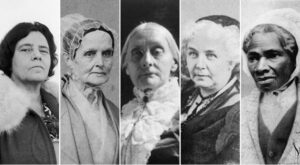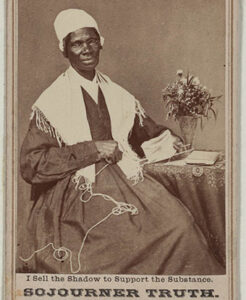The Fight for Racial and Gender Equality
Sojourner Truth’s “Ain’t I A Woman” speech, given at the Women’s Rights Convention in 1851, was concise and logical. She made a clear argument that women and men were capable of the same things, yet men were the only sex who got recognition. She attempted to ease men’s concern that women would become too powerful once they had rights, saying that women would not have taken “more than our pint’ll hold.” She went further to say that even if men did not support the cause, men were in a “tight place” because slaves and women were finally pursuing fair treatment.

Women’s Rights Activists: Alice Paul, Lucretia Mott, Susan B. Anthony, Elizabeth Cady Stanton, Sojourner Truth (Library of Congress)
One of the most powerful parts of her speech was when Truth said, “I can’t read, but I can hear.” These seven words revealed an important truth about the reality of a formerly enslaved black woman in the nineteenth century. Black women such as Truth were in an especially disadvantaged situation, as they were discriminated against on both grounds of race and sex. It is ironic that society tried everything it could to keep black women uneducated, yet Truth used intelligence to make her point. She showed that literacy was not the only form of intelligence, but listening and observation also sufficed. She did not let society define her fate.
However, Truth’s fight would not have been an easy one. If black women achieved equal rights first, there was no guarantee they would have enjoyed the same liberties as white women. If slavery was abolished first, black women would not have been treated equally to black males. Until both racial and gender equality were achieved, they would have had to continue fighting. Thus, the question remains whether both oppressed groups were willing to help one another out in hopes of achieving true equality for all.

